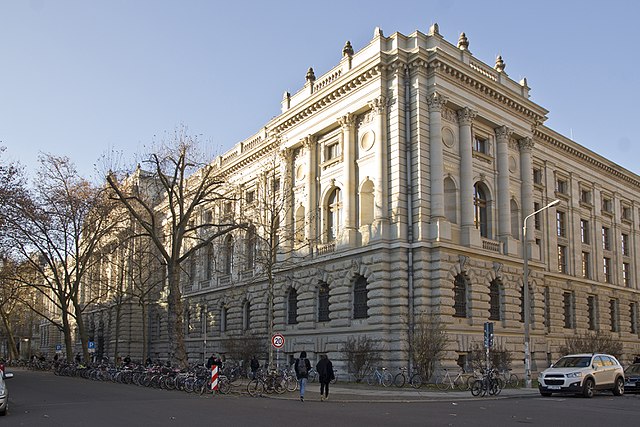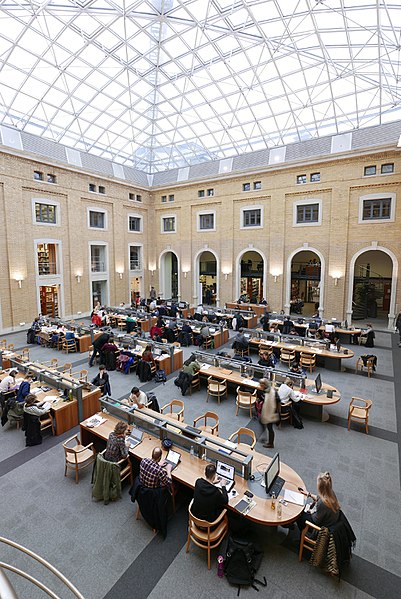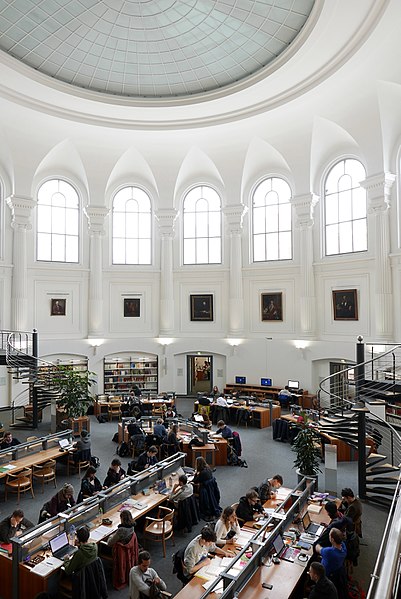
Leipzig University Library, Germany
The Leipzig University Library is located in the eastern German state of Saxony. Leipzig is Germany’s tenth most populous city, around 160 kilometres (99 mi) southwest of Berlin. Among its most distinguished past residents was the classical composer Johann Sebastian Bach. The Thammasat University Libraries own several recordings of the music of Bach, as well as books about his work. The Leipzig University Library dates back to the 1500s. By the 1600s, a printed catalogue had been produced of the library’s manuscript holdings. One hundred years later, a handwritten catalog of its printed books was made available. By then the library was mostly a storage place where old ajarns donated their libraries after retirement. century later. The library was only open for students and ajarns to use for two hours per week. In the 1800s, the status of the library changed, and it became a well-funded research institution. Manuscripts from ancient to modern times were acquired. A 347-volume catalog was introduced in the 1850s. Only in 1940, during the Nazi era, did a card catalog system become available, followed by an electronic catalogue, completed in 2013. Today the main building, the Bibliotheca Albertina, is one of 15 branch locations for the University Library. Although bombing during the Second World War destroyed much of the Bibliotheca Albertina building, after much restoration work, it is now used by researchers who appreciate the beauty of what is left. It has had many distinguished librarians as directors. One of them, Joachim Feller, who lived in the 1600s, was a professor of poetry and book collector. He was also an expert on the interpretation and understanding of historical texts and sources. Professor Feller had the unusual fate for a librarian of dying after falling out of a window in his home while he was sleepwalking one night. Fortunately, this type of accident rarely occurs to librarians.
The current director of the library is the German librarian and historian of philosophy Ulrich Johannes Schneider. In addition to serving as director of the Leipzig University Library, Dr.Schneider is also associate professor of philosophy at the Institute of Cultural Studies of the University of Leipzig. Among his academic interests are history, especially the cultural history of philosophy, as well as the history of universities in the Age of Enlightenment. Although no specific limits in years have been set to define the Age of Enlightenment or Age of Reason, it usually refers to an intellectual and philosophical movement that was important in the world of ideas during the 1700s, and still has influence today. Dr. Schneider is also an expert on 20th Century French philosophy and the history of libraries. Among his many published works include studies on East German philosophy, the history of philosophy, libraries and the history of knowledge, and the modern French philosopher Michel Foucault. The TU Libraries own a number of books on the history of libraries and also books by and about Michel Foucault. In 2008, when the major German encyclopaedia publisher Brockhaus announced that it would switch to an all-digital instead of printed format for forthcoming editions, Dr. Schneider was interviewed by a leading German newspaper. He felt that the news represented a cultural change, but no great loss. Dr. Schneider explained that in the future, content selectively downloaded on screens will become more familiar in libraries as well as in private homes. He does not believe that the screen can completely displace the wall of books in the foreseeable future. But it will become more important. He added:
Books are wonderful machines, and I am glad that I am surrounded by them in my apartment and in the library. But the Internet turns knowledge into an experience through its inherent dynamism and dialogical nature.
The Bibliotheca Albertina collection currently includes over 5.5 million volumes, with 8,700 manuscripts and 3,600 early printed books. There are also around 25,000 prints from the 1500s onwards and about 6,500 journals. Approximately 3.5 million of the books are in a storage area and must be requested, while the others are on open shelves in the three main readings rooms. Among the many treasures of its Rare Book Collection is the Ebers Papyrus, the only complete surviving medical scroll from Ancient Egypt, dating back some 3500 years. It is over 18 meters long and was donated to the Leipzig University Library in the 1870s by Georg Ebers, a local Egyptologist.

Thailand and Germany
As many Thais know, among the associations promoting exchange between the Kingdom of Thailand and Germany is the German-Thai Chamber of Commerce (GTCC). Located in Bangkok, GTCC has promoted bilateral economic relations between Germany and Thailand since 1962. It has over 600 members, as one of the most significant foreign chambers of commerce in Thailand. As its website notes, economic relations between Thailand and Germany started in 1860. Today, over 600 German companies have a presence in Thailand, mostly in the industrial sector. Germany is a trading partner for engines, medical technology, and automobiles. More German products are exported to Thailand than in the opposite direction. Goods exported from Thailand to Germany include:
- IT machinery
- gemstones
- rubber products
- textiles
Goods imported from Germany to Thailand include:
- machinery
- chemical products
- cars and spare parts
- electronic products
Last October, at a ceremony commemorating the anniversary of the reunification of East and West Germany, His Excellency Peter Prügel, Ambassador of Germany to the Kingdom of Thailand, spoke at a gathering at the Mandarin Oriental Hotel in Bangkok. He added:
We thank the Kingdom as a long-time partner and true friend. This year marks the 155th anniversary of the signing of the Treaty of Friendship, Trade and Shipping by His Majesty King Mongkut and Count Eulenburg. It marks the beginning of official relations between our countries. This agreement was the starting point for a unique cooperation that quickly bore fruit and has allowed our countries to become close and reliable partners.
Germany has become Thailand’s most important trading partner in Europe. The German Academic Exchange Service (DAAD), with over 60 years of presence in Thailand, represents over 200 German-Thai university collaborations, with around 1,000 Thai exchange students being educated in Germany. One way that TU students can enjoy an academic exchange program in Germany is if they study the German language before going. The German-Southeast Asian Center of Excellence for Public Policy and Good Governance (CPG), located at the TU Faculty of Law, Tha Prachan campus, offers a program of CPG German Language Classes. Students who are not admitted to a semester’s classes can apply again in the following round of classes in the next semester.
Outside of academia, Thailand welcomes about 800,000 German tourists annually, and 30,000 Germans currently live all or part of the year in the Kingdom. Each year about 60,000 Thais travel to Germany as tourists, and around 100,000 Thais live there as residents.

(All images courtesy of Wikimedia Commons)
